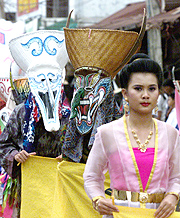 |
| Thais wear masks representing the laughing spirits of the dead springing back to life at the annual Phi Ta Khon festival in Dan Sai, 520 kilometres northeast of Bangkok near the Laos border June 24, 2001. The event is one of Thailand's most colourful festivals in which the spirits of the dead spring back to life as fun-loving ghosts dancing to traditional tunes in a centuries-old ritual believed by locals as a means of driving away bad fortune. |
Everyone loves a good ghost story. The gruesome, the spiritual and the supernatural arouse an instinctive curiosity in all of us. In the west, ghostly fervor reaches a peak with Halloween on October 31. In Thailand, the spirit-world comes closest to us in June with the Phi Ta Khon festival, an event filled with fun, mischief and of course, a touch of the unknown.
The Phi Ta Khon Festival is quite unique to Thailand and unrivalled by any other ghost festival. Held in Dan Sai district of Loei province, about 450 km north of Bangkok, Phi Ta Khon is part of a Buddhist merit-making holiday known locally as 'Bun Pha Ves.' The precise origin of Phi Ta Khon is unclear. But it is believed that the roots of the festival revolve around an important tale of the Buddha's last life, before he reached nirvana.
According to Buddhist folklore, the Buddha-to-be was born as Prince Vessandorn, a generous man who gave freely to the people. One day, he gave away a white elephant, a royal creature, revered as a symbol of rain. The townspeople were so angry for fear of drought and famine, that they banished the prince into exile.
The prince left the village for a very long journey. Finally, the king and the people got over their anger and recalled him to the city. When he eventually returned, his people were overjoyed. They welcomed him back with a celebration so loud that even the dead were awakened from their slumbers to join in the festivities.
Phi Ta Khon is held with the arrival of the sixth or seventh lunar month. Young male villagers prepare their ghostly attire and masks, while children roam around town playing tricks. Sheets or blankets are sewn together to look like shrouds while traditional wooden bamboo containers used to store sticky rice (huad), are creatively fashioned into bizarre hats. The huge masks are carved from the bases of coconut trees. The spirit masks are the integral part of the celebrations, which last for three consecutive days.
The first day is marked by a masked procession, accompanied by rejoicing, music and dancing. On the second day, the villagers dance their way to the temple and fire off bamboo rockets to signal the end of the procession. Along the way, they tease onlookers as they accompany a sacred image of the Buddha through the village streets. Monks recite the story of the Buddha's last incarnation before attaining enlightenment.
The festival organizers also hold contests for the best masks, costumes and dancers, and plaques are awarded to the winners in each age group. The most popular event is the dancing contest among those dressed up as ghosts.
On the last day of the event, the villagers gather at the local temple, Wat Ponchai, to listen to the message of the thirteen sermons of the Lord Buddha, recited by the local monks. The ghost dancers then put away their ghostly masks and costumes for another year, return to the paddy fields and continue to earn their living with the onset of the new crop season.
|